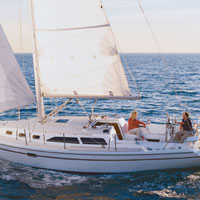Q: At what stage should a new sailor learn the basics of navigation?
A: I would encourage a new sailor to take advantage of Power Squadron and U.S. Coast Guard Auxiliary Seamanship and basic navigation courses long before they head out to sea! In addition, I would recommend that new sailors purchase an inexpensive GPS receiver and learn how to use it on land before going out on the water.
Q: Why do you believe navigation is important?
A: There are no road signs out on the water … good navigation skills will keep you off the rocks! It’s that simple and that important.
Q: How can a new sailor learn about navigation?
A: There are many excellent sailing schools that offer navigation courses. Professional sailing schools may give each student a lot more than just classroom time to hone navigation skills. Although this option may have a modest tuition fee, navigation is one of the most important aspects of safer sailing and is well worth the investment. As another option, there are also many online navigation courses that can be studied at home.
Q: What is the benefit of attending a professional sailing school to learn navigation?
A: Professional schools will actually put equipment in your hands out on the water. This could include a portable GPS receiver, electronic chart plotters, plus paper charts and parallels. It’s one thing to navigate in a classroom setting … and altogether different when working a GPS receiver or paper charts out on the water in choppy seas!
Q: How do I take the next step?
A: It’s as easy as signing up for a FREE course from the local Coast Guard Auxiliary and U.S. Power Squadron. In addition, both can certainly recommend “on the water” continuing education courses through their own agencies, as well as through known, reputable sailing schools. My recommendation for new sailors is to learn navigation skills both in the classroom as well as out on the harbor.
Content provided by www.discoversailing.com
